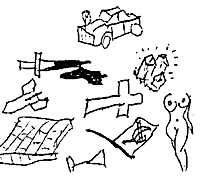What is ‘Sin’?

What is so-called sin? ‘Sin’ is the religious term historically used to describe the darker, destructive aspects of our non-ideal human state or condition. Various religious traditions list types of behaviour that constitute ‘sinful’ acts or thoughts e.g. lust, anger, pride, envy etc, which means that we are all aware of what ‘sin’ is, but the real question, the one that remains, is what is the origin of ‘sin’?
To answer that question we needed to be able to understand the human condition–namely humans’ extraordinary capacity for ‘good and evil’, and in particular the origin of our ‘evil’, ‘sinful’ or non-ideal state. Most wonderfully, biology is now able to provide the full explanation of our contradictory behavior. This comprehensive explanation of the origin of ‘sin’, namely the human condition, is available in this Video Series and Freedom: Expanded Book 1, by Jeremy Griffith.
With the explanation of our condition now available, we are able to see that humanity’s current upset or ‘sinful’ state, characterised by angry, alienated and egocentric behavior, is the result of a two million year old, unavoidable clash between our gene-based instincts and our emerging nerve-based consciousness.
Religions described behavior that was at odds with the cooperative, loving and selfless ideals as ‘sinful’. However, as biologist Jeremy Griffith explains, “a look at the Seven Deadly Sins of the human condition, of lust, anger, pride, envy, covetousness, gluttony and sloth, are in truth all different manifestations of the three fundamental upsets of anger, egocentricity and alienation that unavoidably emerged when humans became fully conscious and had to set out in search of knowledge in the presence of unjustly condemning instincts.” (Part 3 of Freedom: Expanded Book 1 )
The fundamental difference that comes with full understanding of the human condition is that when we now ask ‘what is sin?’ we can see that it was not bad or evil, as religions held. The full story shows that ‘sin’ or upset was actually a heroic state that we humans have had to suffer in order to fulfill the potential of developing from instinctively driven animals into conscious human beings.
(Please note that this explanation does not condone upset or so called sinful behavior; the full compassionate understanding ameliorates it, allowing such behavior to subside.)




Please wait while the comments load...
Comments